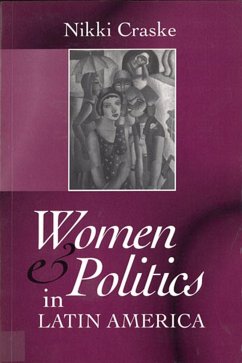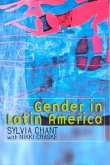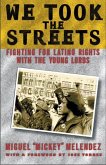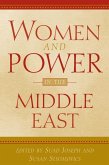Nikki Craske
Women and Politics in Latin America
Nikki Craske
Women and Politics in Latin America
- Broschiertes Buch
- Merkliste
- Auf die Merkliste
- Bewerten Bewerten
- Teilen
- Produkt teilen
- Produkterinnerung
- Produkterinnerung
This book provides a comprehensive view of women's political participation in Latin America. Focusing on the latter half of the twentieth century, it examines five different arenas of action and debate: political institutions, workplaces, social movements, revolutions, and feminisms. Nikki Craske explores the ways in which women have become more effective in the public arena as the context of politics has altered.
Andere Kunden interessierten sich auch für
![Gender in Latin America Gender in Latin America]() Sylvia ChantGender in Latin America48,99 €
Sylvia ChantGender in Latin America48,99 €![Latinas in American Politics Latinas in American Politics]() Latinas in American Politics67,99 €
Latinas in American Politics67,99 €![We Took the Streets We Took the Streets]() Miguel MelendezWe Took the Streets46,99 €
Miguel MelendezWe Took the Streets46,99 €![From Homemakers to Breadwinners to Community Leaders From Homemakers to Breadwinners to Community Leaders]() Norma Fuentes-MayorgaFrom Homemakers to Breadwinners to Community Leaders42,99 €
Norma Fuentes-MayorgaFrom Homemakers to Breadwinners to Community Leaders42,99 €![The Political Thought of Elizabeth Cady Stanton The Political Thought of Elizabeth Cady Stanton]() Sue DavisThe Political Thought of Elizabeth Cady Stanton38,99 €
Sue DavisThe Political Thought of Elizabeth Cady Stanton38,99 €![Women and Contemporary Scottish Politics Women and Contemporary Scottish Politics]() Esther Breitenbach / Fiona MackayWomen and Contemporary Scottish Politics49,99 €
Esther Breitenbach / Fiona MackayWomen and Contemporary Scottish Politics49,99 €![Women and Power in the Middle East Women and Power in the Middle East]() Women and Power in the Middle East38,99 €
Women and Power in the Middle East38,99 €-
-
-
This book provides a comprehensive view of women's political participation in Latin America. Focusing on the latter half of the twentieth century, it examines five different arenas of action and debate: political institutions, workplaces, social movements, revolutions, and feminisms. Nikki Craske explores the ways in which women have become more effective in the public arena as the context of politics has altered.
Hinweis: Dieser Artikel kann nur an eine deutsche Lieferadresse ausgeliefert werden.
Hinweis: Dieser Artikel kann nur an eine deutsche Lieferadresse ausgeliefert werden.
Produktdetails
- Produktdetails
- Verlag: Rutgers University Press
- Seitenzahl: 272
- Erscheinungstermin: 1. März 1999
- Englisch
- Abmessung: 229mm x 152mm x 19mm
- Gewicht: 254g
- ISBN-13: 9780813526935
- ISBN-10: 0813526930
- Artikelnr.: 22462386
- Herstellerkennzeichnung
- Libri GmbH
- Europaallee 1
- 36244 Bad Hersfeld
- gpsr@libri.de
- Verlag: Rutgers University Press
- Seitenzahl: 272
- Erscheinungstermin: 1. März 1999
- Englisch
- Abmessung: 229mm x 152mm x 19mm
- Gewicht: 254g
- ISBN-13: 9780813526935
- ISBN-10: 0813526930
- Artikelnr.: 22462386
- Herstellerkennzeichnung
- Libri GmbH
- Europaallee 1
- 36244 Bad Hersfeld
- gpsr@libri.de
Nikki Craske is a lecturer in politics at Queen's University of Belfast. She has coedited Mexico and the North American Free Trade Agreement: Who Will Benefit? and Dismantling the Mexican State.
List of Tables
Acknowledgements
Acronyms
Argument
Why women?
Political exclusion
The shifting terrain
Mothers, women, citizens: tensions
Organization of the book
Conclusions
Women and Political Identity in Latin America
Introduction
Constructing gender relations
Machismo and marianismo
Conceptualizing women's political participation
Gender interests
Developing citizenship
Conclusions
Setting the Scene
Introduction
Latin American political systems in the twentieth century
Economic developments
Social structures
Latin American women: a glance at the statistics
Conclusions
Formal Political Representation: Governments, Parties and Bureaucracies
Introduction
The struggle for formal citizenship
Women's legislative representation and office holding
Government impact on women's political participation
Political parties
Bureaucracies
Conclusions
The Impact of Work on Political Identity
Introduction
Changing work experiences
Collective action in the workplace
The political implications of work
Conclusions
Social Movements: Consumer and Human Rights Organizations
Introduction
The rise of social movements
The development of consumer organizations
Human rights organizations: the origins
Structures and organization
Facilitating organizations: professionalization of protest
Political implications of social movements
Constraints
Conclusions
Revolutionary Empowerment?
Introduction
The armed struggles
The revolutionary states
Cuba
Nicaragua
Counter-revolution
Conclusions
Feminisms in Latin America
Introduction
Feminist or feminine?
The roots of feminism in Latin America
Second-wave feminism
Contemporary feminism and the Regional Feminist Meetings
State feminism
Conclusions: challenges to feminism in the 1990s
Conclusions: Politics: an Ambivalent Experience
Changing gender relations
Political motherhood
Redefining politics
Gender interests
The 1990s and beyond
Notes
References
Index
Acknowledgements
Acronyms
Argument
Why women?
Political exclusion
The shifting terrain
Mothers, women, citizens: tensions
Organization of the book
Conclusions
Women and Political Identity in Latin America
Introduction
Constructing gender relations
Machismo and marianismo
Conceptualizing women's political participation
Gender interests
Developing citizenship
Conclusions
Setting the Scene
Introduction
Latin American political systems in the twentieth century
Economic developments
Social structures
Latin American women: a glance at the statistics
Conclusions
Formal Political Representation: Governments, Parties and Bureaucracies
Introduction
The struggle for formal citizenship
Women's legislative representation and office holding
Government impact on women's political participation
Political parties
Bureaucracies
Conclusions
The Impact of Work on Political Identity
Introduction
Changing work experiences
Collective action in the workplace
The political implications of work
Conclusions
Social Movements: Consumer and Human Rights Organizations
Introduction
The rise of social movements
The development of consumer organizations
Human rights organizations: the origins
Structures and organization
Facilitating organizations: professionalization of protest
Political implications of social movements
Constraints
Conclusions
Revolutionary Empowerment?
Introduction
The armed struggles
The revolutionary states
Cuba
Nicaragua
Counter-revolution
Conclusions
Feminisms in Latin America
Introduction
Feminist or feminine?
The roots of feminism in Latin America
Second-wave feminism
Contemporary feminism and the Regional Feminist Meetings
State feminism
Conclusions: challenges to feminism in the 1990s
Conclusions: Politics: an Ambivalent Experience
Changing gender relations
Political motherhood
Redefining politics
Gender interests
The 1990s and beyond
Notes
References
Index
List of Tables
Acknowledgements
Acronyms
Argument
Why women?
Political exclusion
The shifting terrain
Mothers, women, citizens: tensions
Organization of the book
Conclusions
Women and Political Identity in Latin America
Introduction
Constructing gender relations
Machismo and marianismo
Conceptualizing women's political participation
Gender interests
Developing citizenship
Conclusions
Setting the Scene
Introduction
Latin American political systems in the twentieth century
Economic developments
Social structures
Latin American women: a glance at the statistics
Conclusions
Formal Political Representation: Governments, Parties and Bureaucracies
Introduction
The struggle for formal citizenship
Women's legislative representation and office holding
Government impact on women's political participation
Political parties
Bureaucracies
Conclusions
The Impact of Work on Political Identity
Introduction
Changing work experiences
Collective action in the workplace
The political implications of work
Conclusions
Social Movements: Consumer and Human Rights Organizations
Introduction
The rise of social movements
The development of consumer organizations
Human rights organizations: the origins
Structures and organization
Facilitating organizations: professionalization of protest
Political implications of social movements
Constraints
Conclusions
Revolutionary Empowerment?
Introduction
The armed struggles
The revolutionary states
Cuba
Nicaragua
Counter-revolution
Conclusions
Feminisms in Latin America
Introduction
Feminist or feminine?
The roots of feminism in Latin America
Second-wave feminism
Contemporary feminism and the Regional Feminist Meetings
State feminism
Conclusions: challenges to feminism in the 1990s
Conclusions: Politics: an Ambivalent Experience
Changing gender relations
Political motherhood
Redefining politics
Gender interests
The 1990s and beyond
Notes
References
Index
Acknowledgements
Acronyms
Argument
Why women?
Political exclusion
The shifting terrain
Mothers, women, citizens: tensions
Organization of the book
Conclusions
Women and Political Identity in Latin America
Introduction
Constructing gender relations
Machismo and marianismo
Conceptualizing women's political participation
Gender interests
Developing citizenship
Conclusions
Setting the Scene
Introduction
Latin American political systems in the twentieth century
Economic developments
Social structures
Latin American women: a glance at the statistics
Conclusions
Formal Political Representation: Governments, Parties and Bureaucracies
Introduction
The struggle for formal citizenship
Women's legislative representation and office holding
Government impact on women's political participation
Political parties
Bureaucracies
Conclusions
The Impact of Work on Political Identity
Introduction
Changing work experiences
Collective action in the workplace
The political implications of work
Conclusions
Social Movements: Consumer and Human Rights Organizations
Introduction
The rise of social movements
The development of consumer organizations
Human rights organizations: the origins
Structures and organization
Facilitating organizations: professionalization of protest
Political implications of social movements
Constraints
Conclusions
Revolutionary Empowerment?
Introduction
The armed struggles
The revolutionary states
Cuba
Nicaragua
Counter-revolution
Conclusions
Feminisms in Latin America
Introduction
Feminist or feminine?
The roots of feminism in Latin America
Second-wave feminism
Contemporary feminism and the Regional Feminist Meetings
State feminism
Conclusions: challenges to feminism in the 1990s
Conclusions: Politics: an Ambivalent Experience
Changing gender relations
Political motherhood
Redefining politics
Gender interests
The 1990s and beyond
Notes
References
Index








